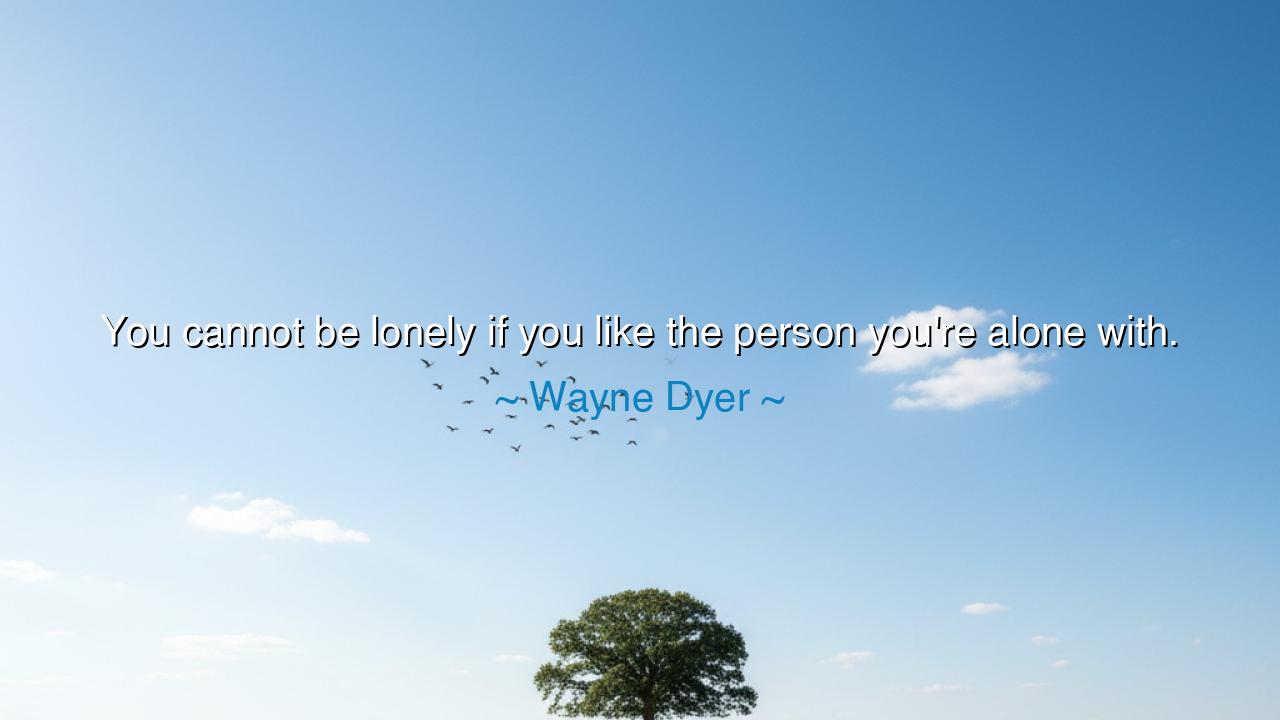
You cannot be lonely if you like the person you're alone with.






"You cannot be lonely if you like the person you're alone with." These words by Wayne Dyer speak to the profound truth that solitude is not inherently a source of loneliness or emptiness. Rather, it is a reflection of how we view ourselves. Dyer’s insight suggests that when we are at peace with who we are, when we are comfortable in our own company, solitude can be an opportunity for self-reflection, growth, and even joy. Loneliness, in contrast, arises not from being physically alone, but from the discomfort we feel in our own presence. The key to peace in solitude, according to Dyer, is learning to love and accept oneself, finding fulfillment not in the company of others, but in the richness of our own inner life.
In the ancient world, self-knowledge was considered the most valuable pursuit. Socrates, the great philosopher, famously declared, "Know thyself." To know oneself was to understand one’s desires, fears, and motivations—something that could only be achieved in solitude, away from the noise and distractions of society. In his solitude, Socrates was able to reflect deeply on his own thoughts and develop the wisdom that would later guide others. He understood that true fulfillment does not come from external sources or other people's validation, but from the internal harmony and wisdom that comes from knowing and liking the person we are.
Similarly, Epicurus, the ancient Greek philosopher, also emphasized the importance of being at peace with oneself. Epicurus taught that pleasure—the ultimate goal of life—was not to be found in the fleeting distractions of external pleasures, but in the simple enjoyment of one’s own company. He believed that to be content, one needed to cultivate inner peace and not be dependent on the validation or approval of others. In solitude, Epicurus found the opportunity to engage in quiet reflection, not to escape from the world, but to connect with his true self. His philosophy suggests that when we are at peace with who we are, we need not fear loneliness, for we are sufficient unto ourselves.
Consider the example of Marcus Aurelius, the Stoic emperor, who often sought moments of solitude despite his great responsibilities. Marcus, though surrounded by the empire and its demands, found solace in his private reflections and his Meditations—a collection of thoughts written during his moments of solitude. Marcus understood that solitude was not something to be avoided, but something to be embraced. In those quiet moments, he found clarity, strength, and a sense of purpose. Marcus didn’t need the distractions of others to find peace; he found it in his own mind, trusting in his own wisdom and inner resources.
Dyer’s quote also speaks to a modern truth: the fear of being alone is not about the absence of others, but the fear of facing our own unresolved emotions or insecurities. We often seek constant companionship because we are uncomfortable with who we are when we are alone. This discomfort can be rooted in self-doubt or unaddressed emotional pain, leading us to fill the silence with the presence of others, hoping they will provide the validation we crave. But as Dyer suggests, true peace comes when we like and accept ourselves. When we learn to embrace our own company, loneliness no longer feels like an enemy, but a companion that offers space for personal growth.
The lesson here is clear: solitude is not something to fear, but an opportunity to cultivate self-love and self-acceptance. Loneliness is not the result of being alone but of being unable to find peace in our own presence. If we seek fulfillment in the company of others rather than in our own hearts, we will always feel empty, regardless of the people around us. The key, then, is to learn to enjoy our own company, to become at ease with who we are. When we can do this, we will find that solitude is no longer a source of loneliness, but a space of growth, creativity, and inner strength.
In practical terms, we must begin by embracing moments of quiet reflection in our daily lives. Whether through meditation, journaling, or simply sitting in stillness, we must learn to appreciate the peace that comes from being with ourselves. By consciously practicing solitude, we can learn to silence the inner critic, to listen to our own thoughts, and to cultivate a deeper sense of self-worth. The more we come to understand and accept ourselves, the less we will fear being alone, for we will see that in solitude, we are never truly alone.
In conclusion, Wayne Dyer’s words remind us that true fulfillment lies not in the presence of others, but in our ability to embrace our own company. Just as the great philosophers of the past understood, solitude is not a burden to be feared, but a gift to be embraced. By cultivating self-love and inner peace, we transform solitude into a source of strength and clarity, freeing ourselves from the shackles of loneliness. Let us, then, begin to value the moments when we are alone, for it is in those moments that we may find our truest selves and our greatest peace.






AAdministratorAdministrator
Welcome, honored guests. Please leave a comment, we will respond soon